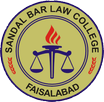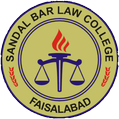
Establishment of Sandal Bar Law College has added in the pool of institutions available for legal education in the region. It is situated at prime location of main Satiana Road Faislabad. It covers an area of forty kanals of land having provision for future expansion. Infrastructure provided in its campus is of the standard prescribed for an institution of higher learning in Pakistan. Its management is committed for providing all facilities to its students which are required for better learning at an advanced level.








Monday : 9:00 - 4:00
Tuesday : 9:00 - 4:00
Wednesday : 9:00 - 4:00
Thursday : 9:00 - 4:00
Friday : 9:00 - 4:00
Saturday - Sunday : Closed
Sandal Bar Law College
8-Km, Main Satiana Road Faisalabad
Phone:
041 8792050
041 8792052
041 5392640
Cell Phone:
0332-6690257





























 Downloads
Downloads


Registration & No Objection Certificate
Sandal Bar Law College offers affiliated & recognized degree program


University Law College, University of the Punjab, is the finest and oldest seat of legal learning in the country. The University Law College is known as the birth place of the finest legal minds in the subcontinent and has been the epitome of judicial heritage in Pakistan since its inception. A number of eminent bureaucrats, politicians, lawyers and judges of higher and superior judiciary are graduates of the college and continue to serve the country to the best of their abilities. Other than training young legal minds, the college focuses on personality development and grooming of students into responsible citizens.
Law College was established in 1868, fourteen years before the University of the Punjab and has a rich history and culture. It later became one of the constituent Colleges of the University of the Punjab. Law classes were initiated by Anjuman-i-Punjab in 1868 and were taken over by the College in 1870. Initially, the degree was spanned over two years. In 1873 entry test was introduced for admission purposes in the program and in the same year Chief Court allowed the college to hold leadership Examination. In 1887, passing of intermediate examination was made a prerequisite for admission in the law program. Later that year, three-fourth attendance was made mandatory for appearing in the examination. In 1890, Government of India empowered the college to confer LL.B. and LL.D. degrees. In order to appear in the LL.B. examination, it was necessary for the aspiring candidates to have graduated in Arts and to have passed the intermediate or the Licentiate in the Law examination.
In 1935, College regulations were revised, and the course of instruction for the LL.B. was increased by a year to a span of three years. However, in 1948, regulations were again revised and the course of instruction for the LL.B. degree was reduced once again to two years. In 1964, under the directions of the West Pakistan High Court, the LL.B professional course was extended to three years and in the same year, College started offering two degree courses in Law; B.L. (academic) a degree of two years duration and LL.B. (Legum Baccalaureus) a degree of three years duration. Holders of LL.B. degree were eligible for enrolment as pleaders. In the year 1966 the duration of the LL.B. degree program was converted into two years. However, since 1992-93, three year Bachelor of Law program was re-introduced.
The main building of the College in earlier years were hosted at Katchery Road. In 1978, the college was shifted to the present premises at Quaid-e-Azam Campus. It is worth noting here that Prof. Dr. Shazia N. Qureshi, Principal of Law College, is the first woman principal in the long and rich history of the college. Her appointment is ranked important by both male and female staff members for inculcating values of merit, removal of discrimination against women in the college specifically, and society, generally, it also encourages young women to join the profession.
SBLC Affiliation































 Downloads
Downloads



 SBLC Affiliation
SBLC Affiliation